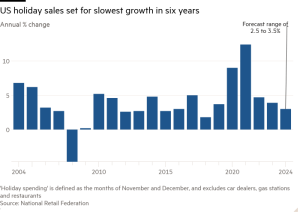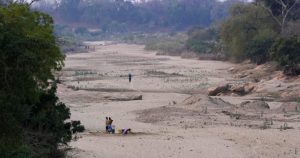New Botswana president aims to fix ties with diamond group De Beers
Botswana’s new president, Duma Boko, has pledged to repair relations with Anglo American’s De Beers diamond business after his unexpected election win in the world’s largest producer of the gemstone by value.
Boko’s party, the Umbrella for Democratic Change, defeated the Botswana Democratic party, which held uninterrupted power since independence in 1966 — the year before De Beers discovered diamonds in the southern African country.
“We have to try to safeguard the goose that lays for us the golden egg,” Boko said in his first speech as president on Saturday, of a once unusually rock-solid partnership between a country and a miner that was considered among the most equitable in the industry.
Botswana, one of Africa’s most prosperous nations, owns the 15 per cent of De Beers that Johannesburg-listed Anglo does not own, and also has half of a joint venture with the company Debswana, which provides most of the group’s diamonds.
But Boko is inheriting blemished ties after populist posturing by his predecessor over a renewal of terms, a downturn in the global diamond market and Anglo’s plans to exit De Beers since it warded off a £39bn takeover offer from BHP earlier this year.
De Beers’ production in Botswana fell a third to 4mn carats in the three months to September versus a year earlier — a further warning sign for the nation’s main export earner.
The IMF has cut estimates for Botswana’s growth this year to just 1 per cent, down from 5.5 per cent in 2022, because of the diamond market rut, which partly reflects surging sales of cheaper lab-grown alternatives.

Former president Mokgweetsi Masisi drove a hard bargain with De Beers before the elections, accusing it of having “short-changed” Botswana and “leaving us in poverty [while] they get rich”.
Alongside lengthened mine licences, Masisi negotiated a new 10-year sales contract in which Botswana can eventually keep up to half of Debswana’s output to sell for itself rather than pass on to De Beers, up from a quarter at present.
The deal reflected a desire for Botswana to wring more wealth from diamonds beyond mining, but it has taken a year to sign.
Zibani Maundeni, a political analyst at the University of Botswana, said the perception of how Masisi handled these talks contributed to his election loss.
Some voters feared his confrontational approach compromised relations with the company and Botswana’s economic stability, Maundeni said. “The negotiations were very antagonistic, and this contributed to the fall in diamond sales.”
Boko said he would hold new talks with De Beers, suggesting he might be willing to negotiate different terms.
Any such negotiations may not last long. Anglo’s chief executive Duncan Wanblad insisted in September that he wanted to offload De Beers by next year and that it was a “low probability outcome” that a sale could drag into 2026.
In a sale or listing Botswana’s government may have to work out how to deal with new majority shareholders or assess whether to increase its own stake, analysts have said.
De Beers did not answer detailed questions, but said this was “one of the most successful and long-standing public-private partnerships in the world” and that it would “continue to work with Botswana’s government in support of shared objectives”.
Botswana has generally been praised for managing its diamond wealth effectively and to the benefit of its 2.5mn people, helping to raise GDP per capita above $7,000 in 2021, one of the highest in Africa.
But in recent years deficits have grown more common after years of trade and fiscal surpluses, and high youth unemployment and inequality also cost Masisi’s party at the polls.
Ian Khama, Masisi’s predecessor as president, said Boko’s new government needed to fix the relationship with De Beers. Masisi’s public criticism of De Beers was “totally irresponsible”, Khama told the Financial Times.
“You don’t treat your partners like that,” he said of Masisi’s strong-arm tactics. “A lot of the development and infrastructure [that] we were able to achieve in the country came from diamonds, and from having partners like De Beers.”
The former president, the son of Botswana’s first post-independence leader and BDP founder Seretse Khama, described the shock election result as a “revolution” and rejection of Masisi’s style of politics.
Khama left the presidency in 2018 after 10 years, handpicking Masisi as his successor. But the relationship quickly degenerated, and Khama fled into exile to South Africa amid allegations from Masisi’s government that he stole $10bn from central bank coffers.
Khama has always denied the claims, which he has called implausible and fabricated.
“I got the overwhelming sense that people were fed up with the BDP,” Khama said, adding that he had only returned to the country six weeks ago. “While the ruling party’s loss isn’t a shock, I never expected them to get such low numbers.”
Khama said that with a new party in charge, Botswana stood a better chance of boosting the economy if the new government could resist what he characterised as resource nationalism.
He cited a 2022 ban on vegetable imports from South Africa, which Masisi presented at the time as a “powerful move to boost our local farmers and economy”. Such policies scared off investors, Khama said.
As Boko prepares for what may be the most difficult patch yet of a long relationship, De Beers has already launched its latest marketing campaign aimed at reviving demand. While the company has traditionally said natural diamonds are “forever”, this season they will be “worth the wait”.
#Botswana #president #aims #fix #ties #diamond #group #Beers



